So I mentioned in my monthly recaps while in Costa Rica all the reasons that I chose to move there for over 2 months, but one of those was because I was shocked at how affordable it was to get there.
I’ve worked out that my flights are usually $200 one-way anywhere in the US. I’m able to get those prices even for longer flights because I book early and I am able to plan my travels around when flight prices are lower. However, despite Costa Rica being way farther than any location in the US, it only cost me about $200 to get there.
Specifically I paid $201.78 on American Airlines to fly from Albany, NY to San José, Costa Rica and $232.34 to fly from San José to Austin, Texas on COPA Airlines to see the Solar Eclipse.
These flight prices were more affordable than flying to the much closer México. I was then shocked to see the monthly Airbnb prices in San José as I’ll go into detail below.
Basically Costa Rica is touted as the most expensive country in Central America and while that is in general true, the flight there and the monthly rents are wildly affordable. But we’re not here just to talk about cost. So let’s get into what I learned during my 2.5 months living in Costa Rica!
Arrival
When we landed in San José, we followed signs to Customs. Once we arrived, there were lines for Citizens and Visitors. We went to join the Visitors line but were directed into a Citizen line – I suspect because they were mostly empty. Efficiency!
We then had our passports checked and the customs employee asked where we were staying. I showed them on my phone because I tag all of our Airbnbs in Google Maps for exactly this reason and that helped a lot since Costa Rica doesn’t really have addresses, which I’ll get into more below.
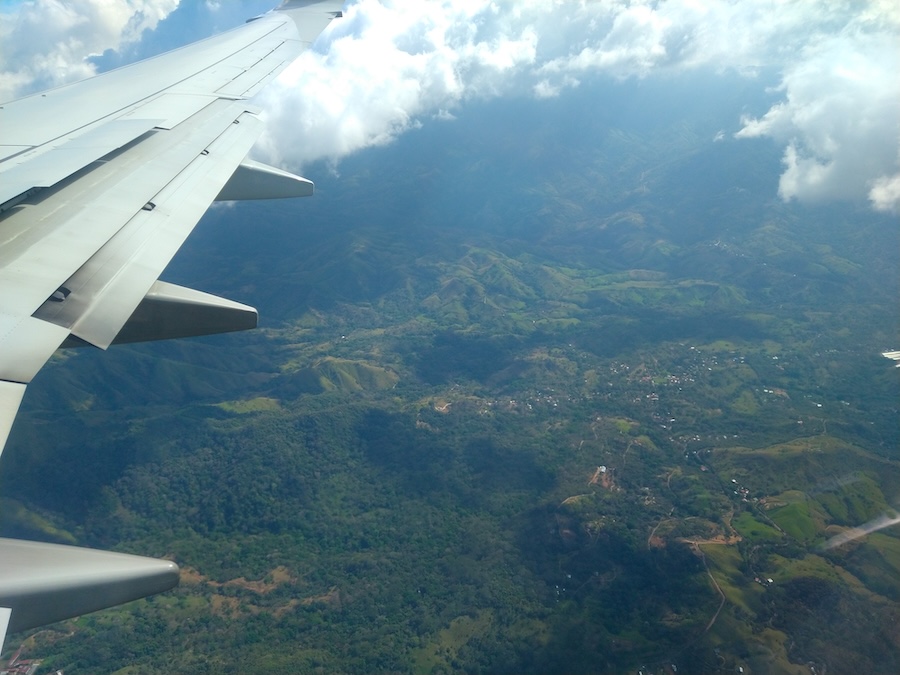
They then asked my occupation (Retired😜) and directed us to enter the country. So we went to Baggage Claim and waited a bit for my Partner’s checked bag. Once that came, we headed outside.
I had read that the previous Costa Rica airport we went to years ago (LIR) didn’t have Uber, but that San José (SJO) does, so I ordered one on the app and it directed me to go outside and to the right past people with tourist signs (who were very nice about it unlike in PVR).
We crossed the street towards the car rentals and then walked further to the right and luckily looked behind us as we went because the ramp to the second floor (Departures) is hidden there and that’s where the Uber pick up is.
After that little walking adventure, we waited for our Uber which picked us up as usual and we were off to our Costa Rican adventure!
Language
One of the reasons I was excited to go back to Costa Rica is because I now know Spanish! And I wanted to continue learning and using Spanish as often as I could so I don’t lose the language.
Spanish
While in San José I discovered something interesting and wonderful for my purposes: basically no one spoke English. Everyone understandably only speaks Spanish, which made me happy since I like to practice my languages in a sink or swim environment.
I heard that in very touristy areas (which San José is not), there are a lot more English speakers, which makes sense. But if you’re planning to stay in San José, I would suggest knowing some Spanish because that’s how you will be interacting with check out people, wait staff and everyone else you encounter.
Helpful Words
When I lived in México I learned that different Spanish-speaking countries at times use different words to mean the same thing, such as the word for peanut or the name for the color purple or even standard greetings. So here are some helpful tips that I plan to use next time I visit CR.
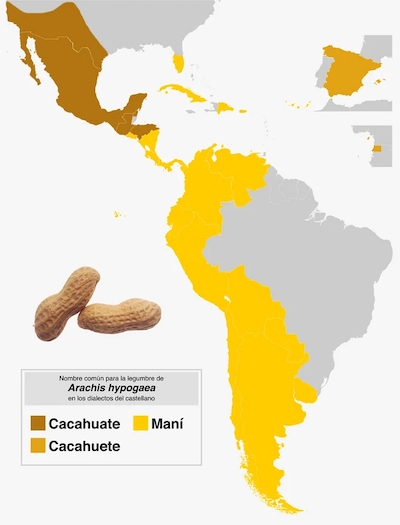
Overall, people in Costa Rica refer to themselves as Ticos (Ticas for all women). And in Costa Rica in response to thank you (gracias), they said con gusto (with pleasure). I was told by one person that the response I learned for you’re welcome, which technically means “of nothing” (de nada) is more informal and something you would say to your family in CR.
The standard greeting in Costa Rica is Buenas. It’s a shorthand for “good morning” (Buenos días), “good afternoon” (Buenas tardes) or “good evening” (Buenas noches) and can be used at any time of day. It’s just more casual. I love the efficiency and the assistance for retirees since I rarely know what time it is 🙂 .
I talk in the Medical section below about my adventure to buy bandaids in Costa Rica and it was an adventure because I discovered that a lot of Spanish-speaking countries use a different word for bandaid:
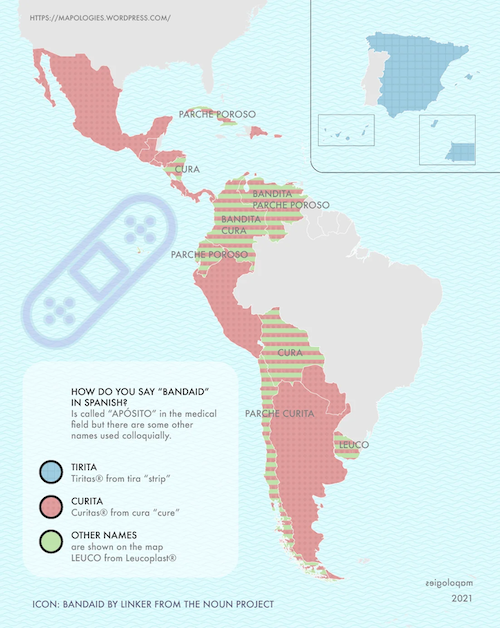
And finally, in México the doors say jale (pull) and in Costa Rica doors say hale, which I originally thought was just a difference in spelling, but I looked it up and they’re different verbs both meaning to pull. Learning!
Walkability
Walking around San José is mostly a joy. The sidewalks are wide, well paved and great for running, which I suspect is part of the reason I saw so many runners at all times going around this city. My people!
However, there were some challenges as a pedestrian, which were surprising to me since most people seem to walk around the city. There were no crosswalks except on bigger streets, which had a pedestrian crossing, buttons to stop traffic and also walk signals.
Downtown some streets don’t have walk signs and are also configured in a strange way so that on some one way streets, I literally couldn’t see the stoplight to see what color it was. Well shit 🙂 .
I hadn’t previously thought about that consequence of one way streets for pedestrians if there aren’t walk signs, but it sucks. However, I avoided trying to cross on those streets and worked around it.
Lastly, a few streets downtown have deep gutters with a small bridge to walk over it on the sidewalk so watch your step if you’re running in that section of downtown. Because of these issues, I preferred using the many pedestrian-only streets that cross San José, such as the ones on Avenida Central, Avenida 4 and Calle 9.
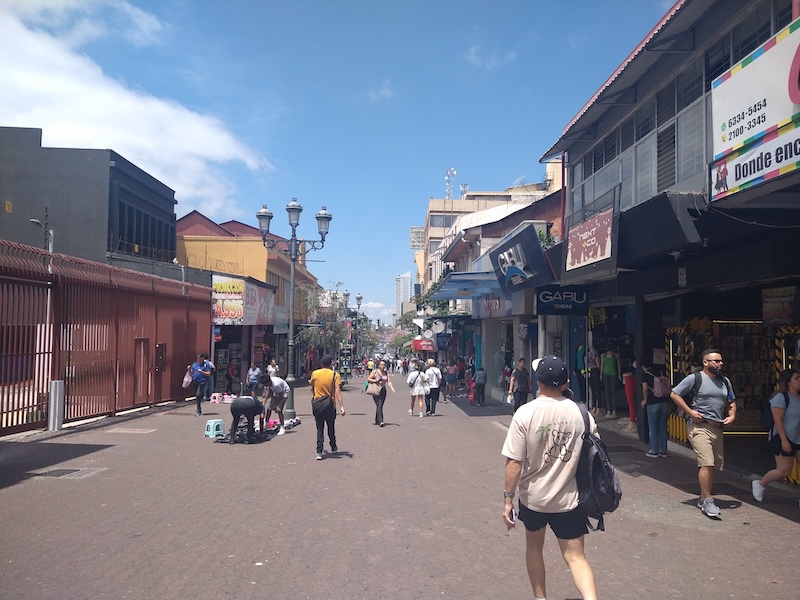
Addresses
So addresses don’t really exist in Costa Rica – they don’t have a centralized system for them. Instead, nearby landmarks or businesses mark destinations. For example, when I asked our host for the address before arriving in the country, I was sent the name of a business that was downstairs.
Luckily this is understood everywhere and when the border control agent asked me where I was staying, I showed them that information and all was well. This is just a quirk of the country 🙂 .
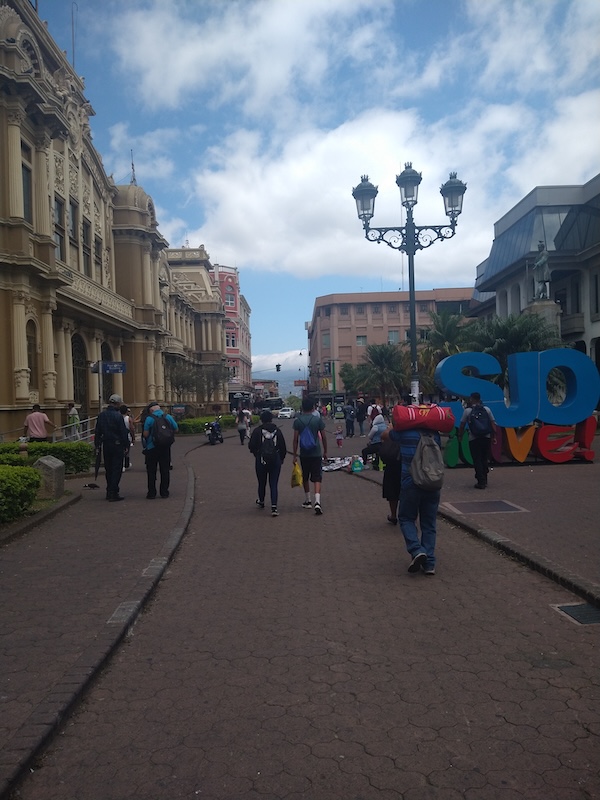
Transit
San José has a lot of great transit options. I didn’t attempt driving myself because some of the intersections look like the below and understandably everything was in Spanish.
I didn’t want to test my language skills in a high stakes situation like that – I’d just be a liability. Anyway, I heard that if I was going to rent a car in the future, that I should use Waze, not Google Maps for accuracy.
However, for walking directions I had no problems using Google Maps.
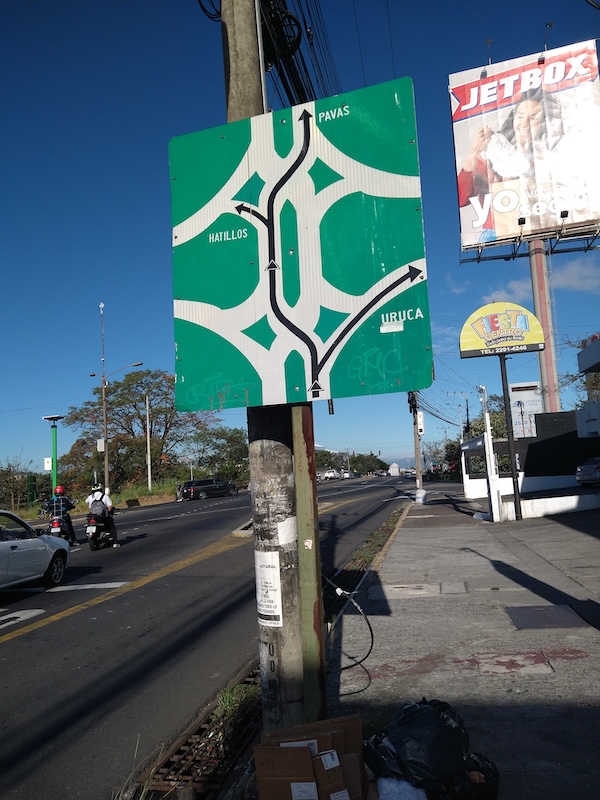
Uber
As I mentioned above, Uber is available at SJO airport, but not at LIR. Uber and taxis do have some beef in Costa Rica and in every Uber besides the one that picked us up at the airport, the driver asked that one of us sit in the front seat so we look like a group of friends to avoid taxi drama.
The Uber app also gave me a pin, which I had never seen before. It seems like an extra safety feature, which I appreciated. When I got in the car, the driver asked for my ride’s four digit pin before we left, to confirm I’m the correct person.
And lastly, our flight from Costa Rica left super early in the morning and I was curious if we would have trouble getting an Uber. And we didn’t – it was seamless even at 3am on a weekday. Sweet!
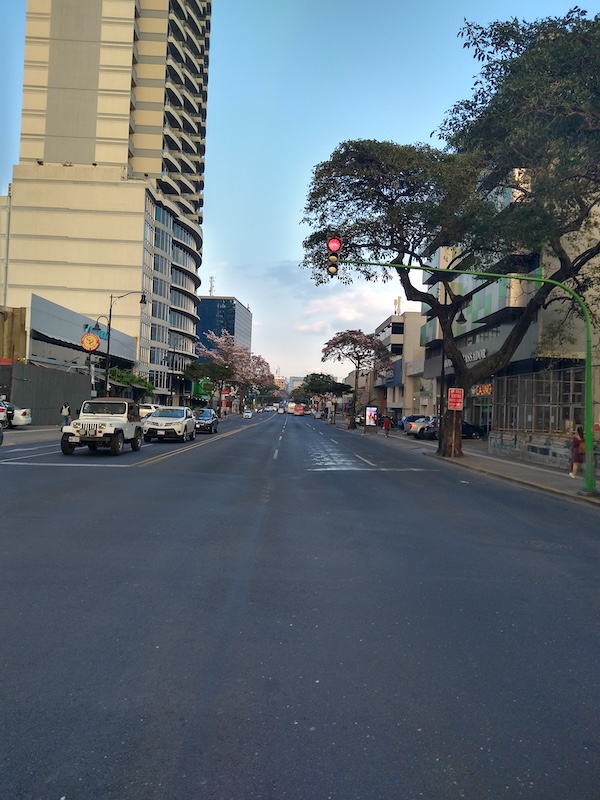
Buses
There were buses going by constantly while I was walking around and they looked like a great option if I didn’t feel like walking or taking an Uber. And yet, I never took one 🙂 .
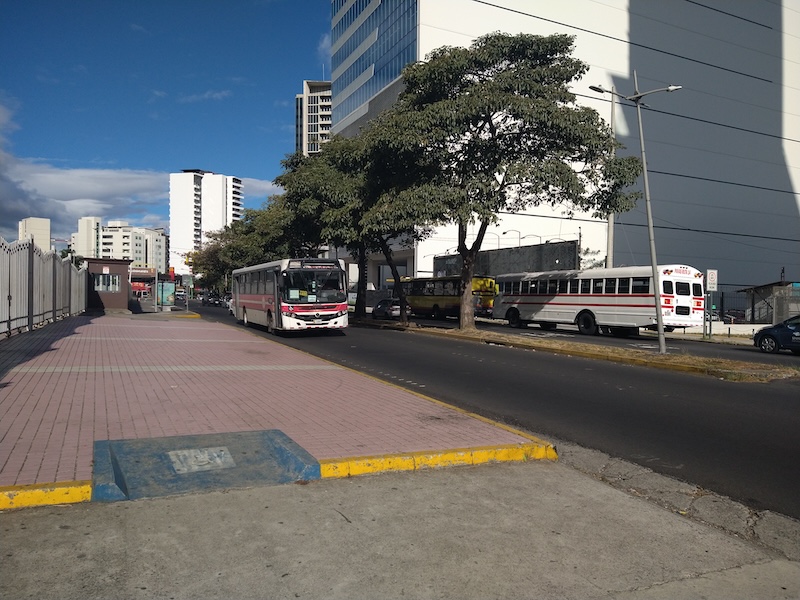
However, for my next visit, the buses in the city apparently have fares of 200-400 colónes ($0.38-$0.76 USD). Not bad at all! Also some of the buses are old school buses, which I found cool.
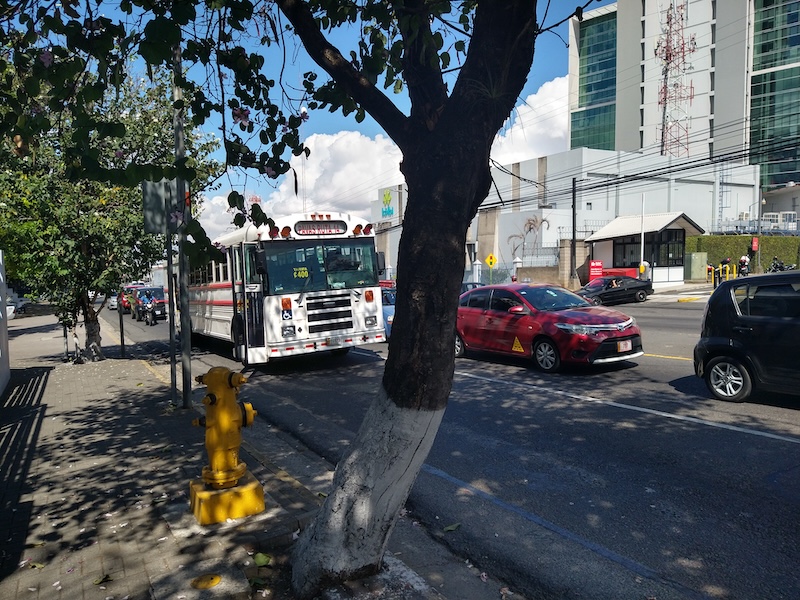
Bikes
Another mode of transit I didn’t take myself, but was curious about was biking! There was an abundance of bike lanes that start near La Sabana Park and go towards downtown.
Inclusivity
About half of the population of Costa Rica lives in the San José metro area and I felt very comfortable in San José even when I was alone. I didn’t see many other black people understandably, but apparently a few people thought I was Argentinian, which was cool.
I was actually surprised by the amount of queer pride flags I saw around the city, but shouldn’t have been because I learned that same-sex marriage is legal in Costa Rica and relationships between same sex couples have been legalized since the 1970s.
Nature
I mentioned some of these fun facts in my monthly recaps, but Costa Rica is one of the most biodiverse places in the world and includes 6.5% of the world’s biodiversity in this relatively small country.
Costa Rica is also apparently one of the “greenest” countries in the world and to try to stay that way, the Costa Rican government plans to make Costa Rica the first carbon-neutral country by 2050. Costa Rica also ranks first in the Happy Planet Index, which is an index of well-being and environmental impact.
Knowing all of that, it’s no surprise that I had a wonderful time exploring this country through walking and running! I posted an Insta Story and put it in my Costa Rica Story Highlights every time I went on a run in case you’re curious about the views I saw on those adventures.
Bugs
I don’t know where the bugs are in Costa Rica. Because I basically never saw any. In fact, I never saw screens on people’s windows and imagine that is why.
There’s no mosquitos trying to suck your blood at all times like in my hometown of Atlanta. Anyway, I loved it! A city with a perfect temperature and no bugs? San José deserves unicorn status.
Pura Vida
Pura Vida or “Pure Life” is the motto of Costa Rica and it’s definitely taken to heart. Based on DMs I received from readers, I expected San José to be a cold, urban center, but instead I was greeted with the greenest mountains I’ve ever seen surrounding the city.
It’s beautiful in every direction and its amazing sunsets and surprisingly clear night sky even made nighttime in the city a show of natural beauty. There were also parks every few blocks and friendly people everywhere. It was lovely 🙂 .
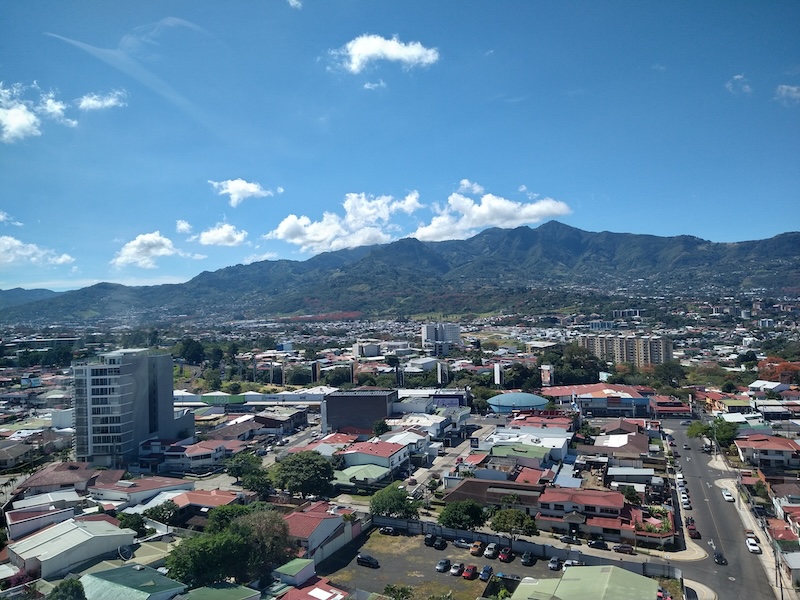
Utilities
Electricity
Costa Rica is once again an easy place to travel from the US because it has the same voltage and types of plugs as the USA. My fancy, new compact Travel Adapter is great but not having to even unpack it is a treat 🙂 .

Water
My Partner has actually been to Costa Rica twice before – once he went without me on a work trip in a more remote part of the country and everyone got sick from drinking the water. So when we arrived this visit, I specifically asked our host if the water was potable. I wanted to double check 🙂 .
He told me all of the drinking water in San José is drinkable and that 93% of the country has drinkable water…so basically just not where my Partner was with his colleagues. Regardless, I’m glad I checked and now I know that Costa Rica is a nice little potable water haven within Central America. It’s the cute, little blue area in the middle of the sea of orange below and as noted in the text, is one of the 3 countries in North America with drinkable water along with the US and Canada.
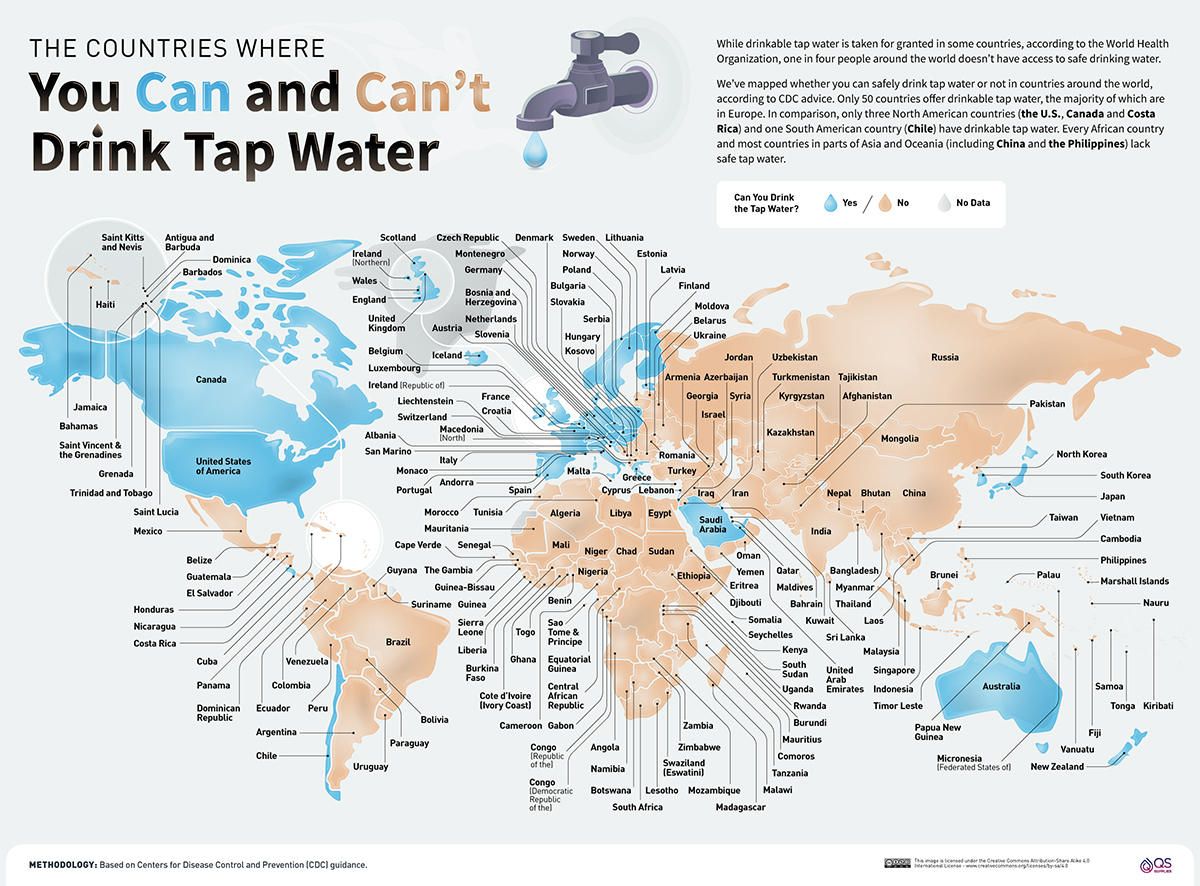
Trash
During this visit we stayed in condos with trash chutes on every floor, so that was easy and we didn’t have to remember when trash day was. However, we did separate our trash like we always did into trash and recycling. Recycling was put directly in the trash room in designated bins on the ground floor.
The bins were separated by glass (vidrio), plastico (plástico) and aluminum (aluminio). I also saw these separations at trash recepticles around the city along with the regular trash/discard (deseche) sections.
Medical
I talk a bunch on this site about my adventures in medical tourism. In essence, the US is ridiculously inefficient with its healthcare and as a result is very expensive without even having great outcomes. So I like to see how other countries do things.
- Medical Tourism: Visiting a Doctor for $2.50 & Filling A $1 Prescription in Mérida, México
- Medical Tourism: A $22 Dental Exam & Cleaning in Buenos Aires, Argentina
- Medical Tourism: A $32 Dental Cleaning in Mérida, México
- Medical Tourism: A $38 Dental Cleaning In Puerto Vallarta, México
In Costa Rica I discovered that you can ask for medicine without a prescription, similar to México, but unlike México the medicine is more expensive – 80% less than in the US compared to México’s 95% in my experience.
However, it was still a relatively great price and I enjoyed being able to top up on prescriptions that would cost so much (like everything) in the US. My Partner even ran out of one of his prescriptions so we headed to another La Bomba pharmacy (my favorite branch in San José) and got his medicine quickly and easily. How about that 🙂 .
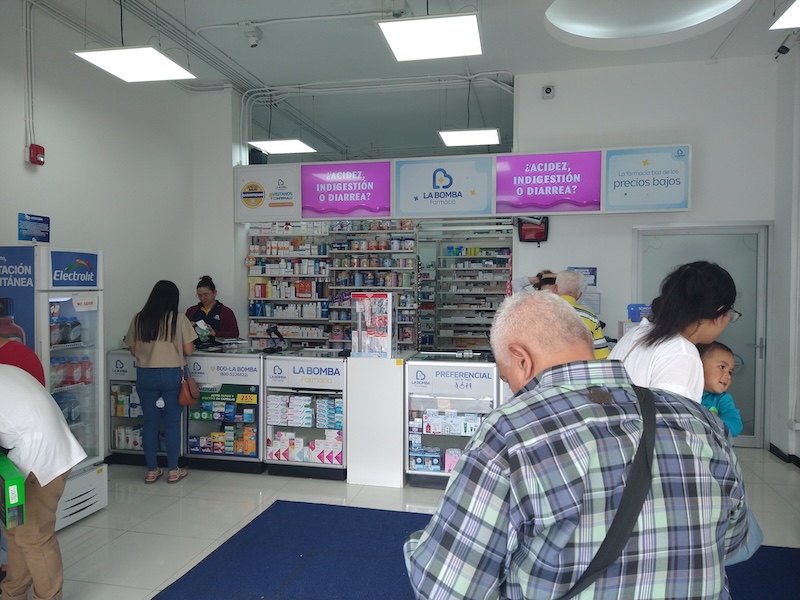
Something else fun that happened was after I took a tumble while running and bloodied my knees, I ran out of the bandaids I always travel with and went to a pharmacy to buy more. I was surprised that they sell bandaids individually! So efficient – I just said how many I wanted and paid pennies for them. Sensational 🙂 .
Money
Let’s talk money! The last time I visited Costa Rica we stayed on the west coast and mostly used cash. During this visit, we obviously stayed in the capital city and luckily credit cards were accepted absolutely everywhere – even on the laundry machines (there was an app for that)!
I never withdrew cash while living in San José for 2.5 months and was impressed that even tiny shops accepted credit cards and had tap to pay. So fancy 🙂 . However, ATMs are all over the place if I wanted to use them and if necessary I would have used the below tip I learned in México to make sure I’m not getting a shitty exchange rate:
The currency in Costa Rica is called the Cólon. It’s unfortunately named after the notorious shithead Christopher Columbus (Cristóbal Colón in Spanish).
Anyway, when I visited Costa Rica in February and March of 2024, the exchange rate was 520 Cólones = 1 USD. To do quick math while I was out and about, I moved the decimal of a price to the left twice and then multiplied by 2 to know the approximate price in USD.
Tipping
Tipping is not normal in Costa Rica. Restaurants already include a 10% service charge on the receipt before it gets to you. I heard that this 10% pre-tip is required by law. We usually tipped on top of that, but I was happy doing so while knowing it’s completely optional and not expected.
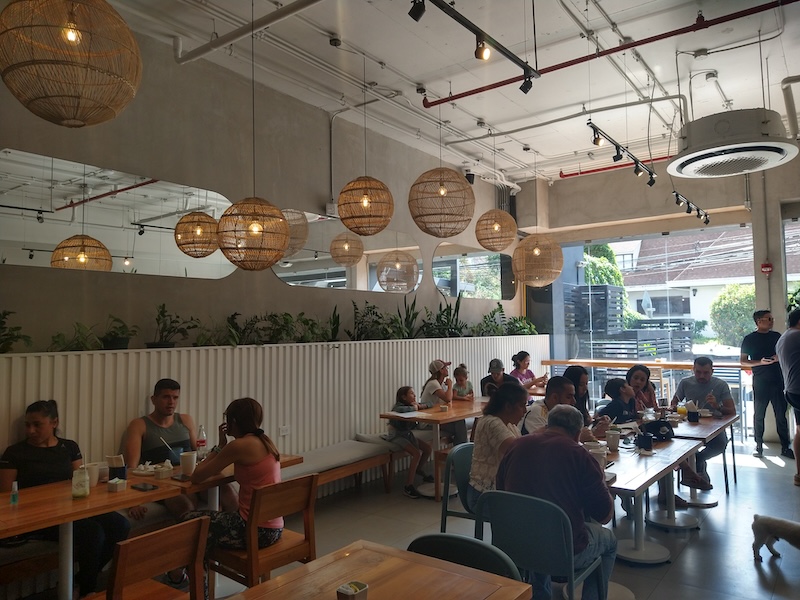
Climate
The weather in San José is a huge part of why we went there. We wanted to escape the dark, cold northeastern US winter and head towards some sun. And Costa Rica delivered! The weather while we were there in February and March was absolutely perfect.
It was high 70s with lows in the 60s and 12 hours of sunlight. It was also often windy, which I love because it makes it feel cooler on a hotter day. I kept wondering why they didn’t call this city Buenos Aires 😉 . The months we were there were also perfect for lack of rainfall. I think I only saw it drizzle once in 2.5 months. It also wasn’t humid, which was lovely.
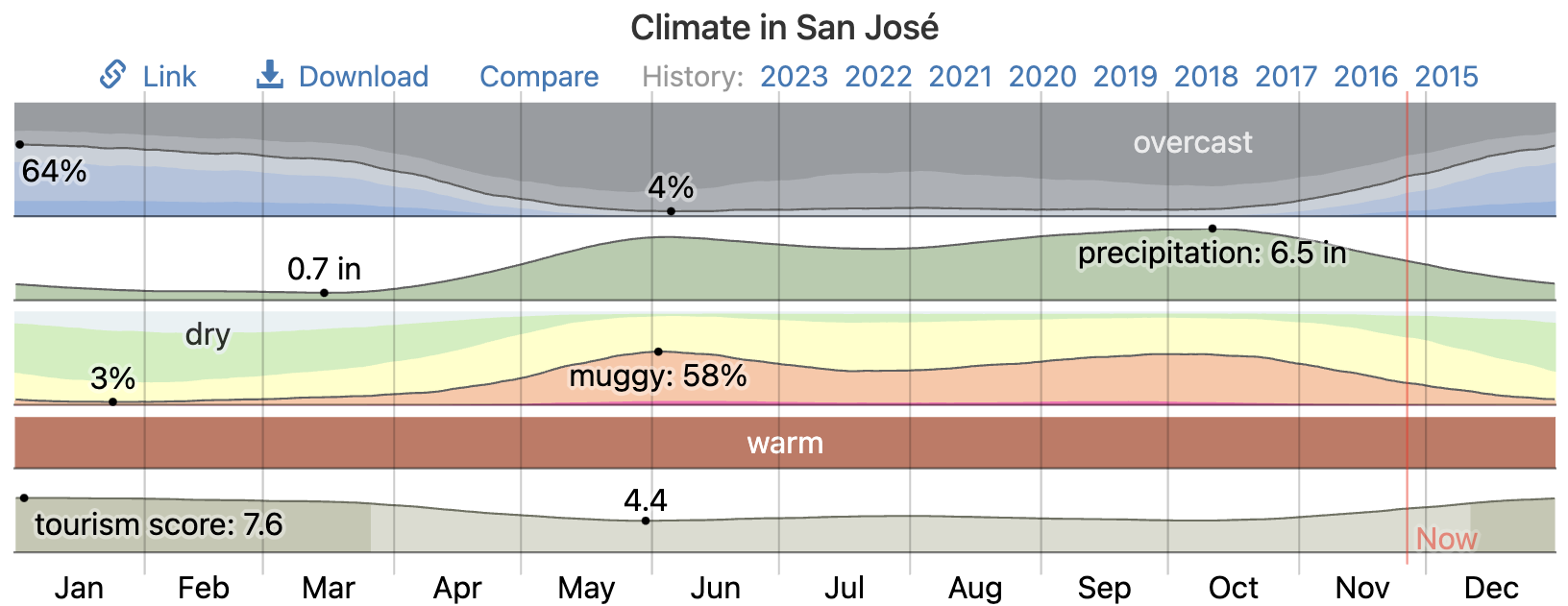
UV Index
The one thing to look out for is the UV in Costa Rica. The country is fairly close to the equator and the sun acts accordingly. I discovered this the last time we visited Costa Rica when my Partner got burned while sitting in the SHADE near the pool. I was shocked.
So this visit I was better prepared. The UV index often gets into the “very high” category even as early as 9:30am until about 3pm, so watch out. Having an easy to read UV index as a part of my mobile weather app was one impetus for me to get the free Today Weather App because it includes UV index and air pollution along with super accurate other data about the weather hour by hour. So I made sure to check what the UV was and when it would increase before heading to the pool and I didn’t get burned at all during this trip!
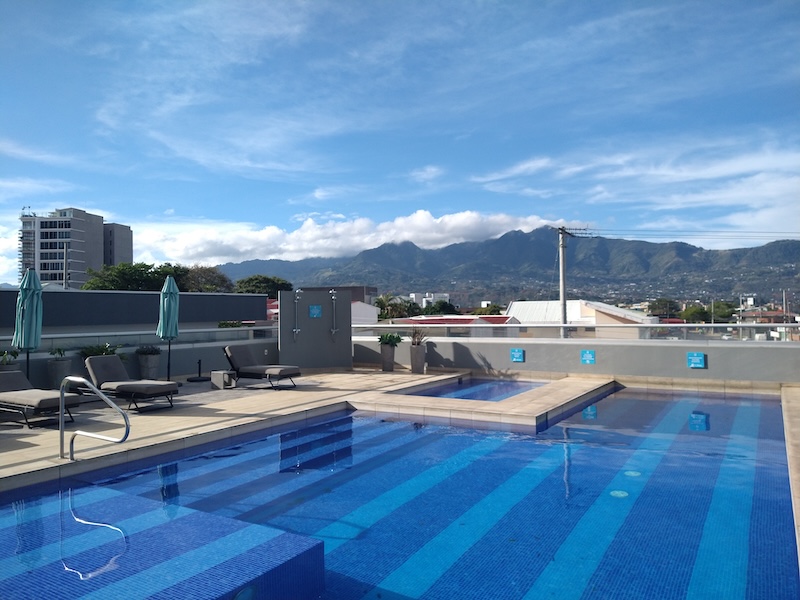
Holidays
During our stay Easter happened and I discovered that San José celebrates for a full week called “Holy Week” leading up to Easter and store hours are often different as a result.
Daylight Savings Time
Costa Rica (smartly) doesn’t engage in Daylight Savings Time (DST). However, the switch in the US happened while we were in Costa Rica and it took me a hot second for me to figure out why my World Clock websites were different 😉 .

Food
Grocery Stores
San José has a fair number of grocery store options. The main ones I visited were Palí, Mas x Menos, Avenida 10 and Fresh Market. Fresh Market reminds me of Whole Foods with its high prices and fancy food options. Interestingly, two of the times I checked out there, the cashier tried to upsell me random snacks that were at the register. Curious 🙂 .
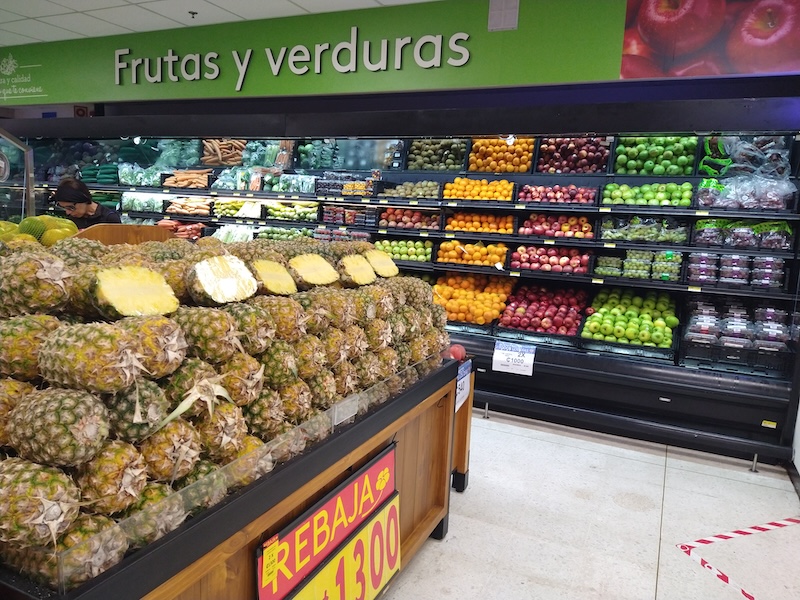
At all grocery stores that I visited, a cashier packs your food back into your grocery cart and then you can wheel the cart out of the way often to a provided long table to pack your bags. Efficient! I like it.
When I visited Avenida 10 I discovered that in their bakery (panadería) after grabbing your items, you have to go up to the counter and get a sticker with a number on it for your items.
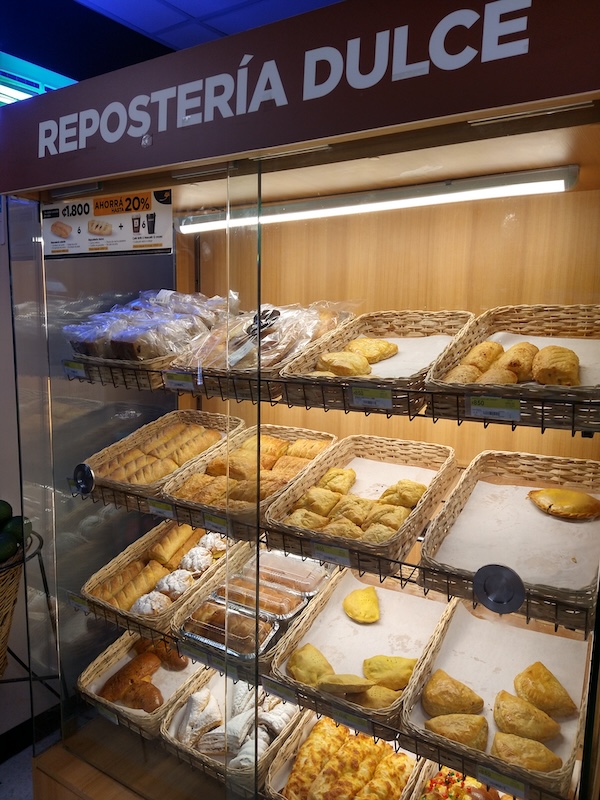
Similarly, after grabbing fruits and veggies, you have to join a line going towards people with mini registers in the fruit and veg section, and they will count what you have and print out a sticker to put on the bag that describes the contents. And finally when I checked out of Avenida 10, they always gave us free candies with our receipt. Cool! I’d never seen that before.
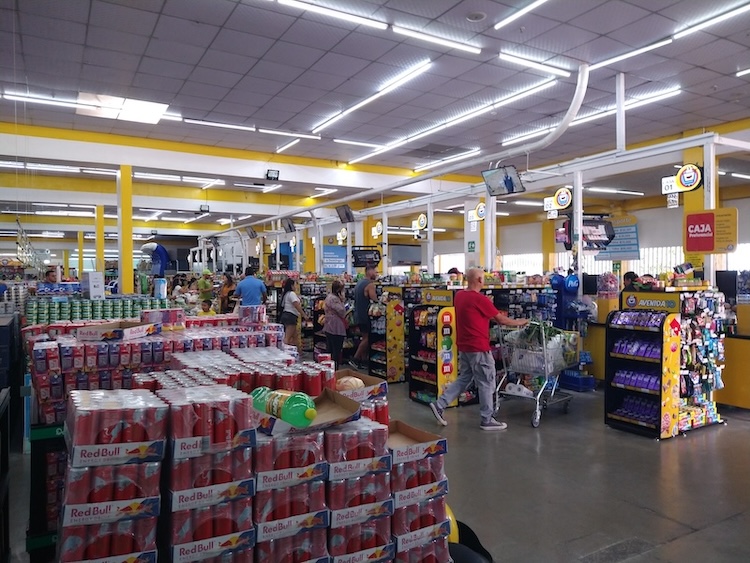
I also visited the stores Palí and Mas x Menos, which are both actually owned by Walmart. Mas x Menos looks exactly like a Walmart while Palí looks like its kept its own branding. The only unique thing that happened to me at these stores was that my second time visiting Mas x Menos, they asked for my ID even though I wasn’t buying alcohol.
I didn’t have my passport at that moment and showed my US ID, which I didn’t think would work, but it did. They just checked my name against the credit card I was using. Maybe I was buying so much stuff that it was suspicious 😉 – I was just stocking up on the good meat prices!
I also learned some interesting things about grocery store food in Costa Rica that I want to remember for my next visit:
I really enjoyed the local Queso Fresco, which is a delicious and squeaky cheese that I had the urge to make into poutine.
The Eggs in Costa Rica were wildly delicious and had a deep, rich color. I have a weird relationship with eggs and I can’t always eat them plain, but with these, I barely put seasoning on them they were so good on their own.
On keto I put heavy cream or whipping cream in my coffee, but that doesn’t really exist in Costa Rica. The closest I could find was Crema Dulce, but I discovered that it turns to butter in a day if you refrigerate it, which it instructs you to do after opening.
So that wasn’t ideal and as a result, I started buying almost individual use packets, but those were even more expensive (and even the large bottle was a pricey $10 USD). It was also at times difficult to find in the store and would be hiding in either the “American” section or baking section of a grocery store.
Something else that I hadn’t seen before was that Costa Rica had Returnable Soda Bottles by Coca Cola. These bottles are more sturdy and you can bring one back and trade an empty one for another full one. However, I found that we kept forgetting to bring it back so we were just buying more regular bottles, which seems to defeat the purpose.
I also tried to actually return the bottle when we were leaving and had my only embarrassing Spanish speaking encounter during my 2.5 months. In the end, they wouldn’t take it back. I guess that’s not how it works. It seems like if you buy one, you are agreeing to trading this bottle back and forth until the end of time. Good to know 🙂 .
“Soda” Restaurants
There are a lot of restaurants called “Sodas” in San José. A Soda is what Ticos call a local restaurant and they’re usually smaller, “mom and pop,” open air places that have food for an affordable price. And like in all restaurants in Costa Rica, the receipt includes a 10% tip upfront as mentioned in the Tipping section.
Delivery
So I didn’t actually use any delivery apps while in Costa Rica. I tried 🙂 , but it didn’t work out. I saw advertisements on restaurants that said they use the apps PedidosYa and Rappi, both of which I saw in Argentina, but I didn’t feel like downloading another app so I went to Uber Eats and tried to order some food. I added everything to my cart only to discover that it wouldn’t work. It said there was a max cost and I had exceeded it with my 2 meals total for me and my Partner. Strange 🙂 .
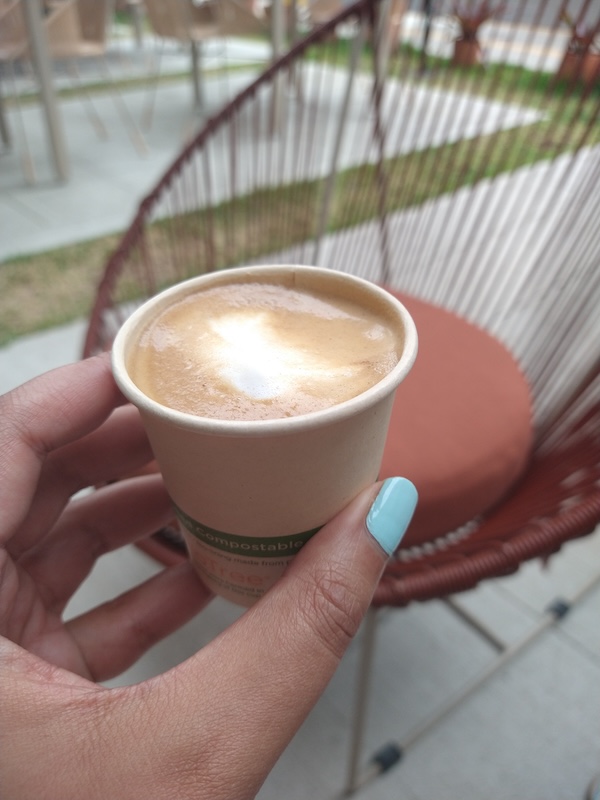
So we did the very difficult task of walking out the door and going to the restaurant we were going to order from 😉 . And it was so easy that we just did that the rest of our visit instead of trying the delivery apps again.
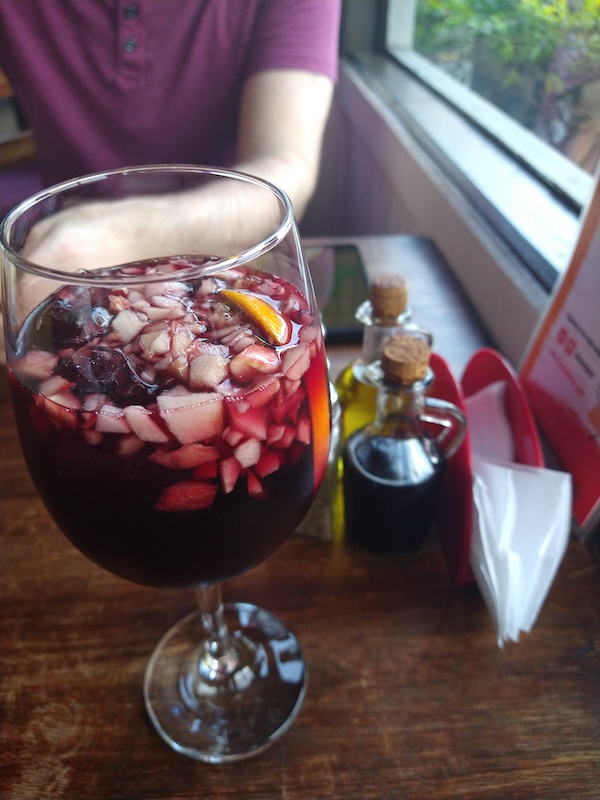
Cost
I like to base estimates on solid facts and that’s why I began my retirement calculations by assuming I would continue spending the same amount that I did during my awesome HCOL life in Seattle, which cost $18,000 a year. I then added 11% on top of that amount just in case, to come to a round $20,000 for my starting annual retirement budget in 2020. So let’s see how San José, Costa Rica compares to Seattle, WA, USA:

These numbers seem accurate based on my experience. Rent was very affordable as you’ll see below, but grocery prices were surprisingly high when compared to the last international location we visited (Puerto Vallarta, México), but not that surprising after spending the holidays in the US.
When I feel inspired to do so I create fun spending charts for each month I’m in another country to provide a specific example of lifestyle costs. So these are my charts that include everything I spent in February and March while in San José.
Lodging
Cost: $808.39/month per person
Below are the two Airbnbs I shared with my Partner during these months in San José. I was floored by the affordability and all the fancy amenities that came with these places. It was lovely 🙂 .
Food
Grocery Cost: $189.35/month
I did a lot of cooking while in San José, which I enjoyed because of how delicious the produce was.
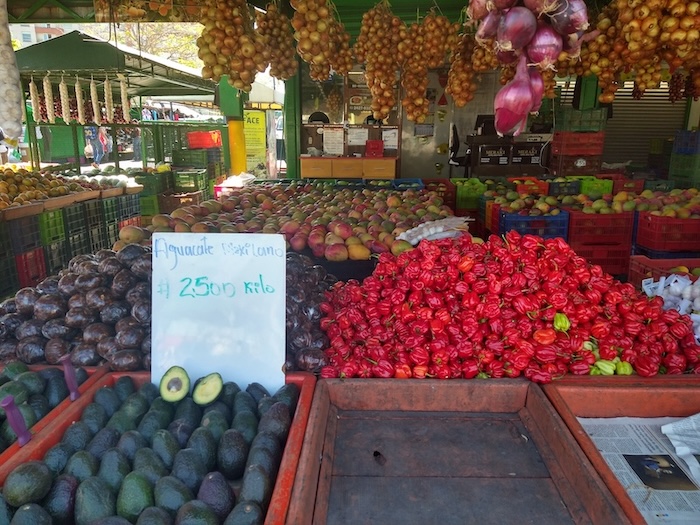
Eating Out Cost: $46.13/month
For this small amount we had some lovely meals outside the house.
Transit
Cost: $3.56/month
This is a testament to how cheap ride shares are in San José. This is just my half of multiple Ubers including one to the airport. Not bad at all 🙂 .
Entertainment
Cost: $48.07/month
This included my movie ticket to see Dune 2 in English on opening night. I checked the movie theater’s website to make sure I chose a screening that said “Sub” or “subtitulada” to indicate it’s subtitled in Spanish and in the film’s original language. Other screenings were listed as dubbed into Spanish with “Dob” or “doblada.” Also a fun tip for the next time I visit is that apparently a lot of cinemas in San José offer half priced tickets on Wednesdays.
This amount for entertainment also included buying Sea Of Thieves when it was on sale for 50% off, buying Sims Get Famous 60% off, and the below Sloth Tour.
Conclusion
And that was my experience living in San José, Costa Rica for 2.5 months! I was curious how living in the country’s capital would differ from chilling on a west coast beach for a week and it was surprisingly similar. The perfect weather in San José coupled with the pools we got to enjoy at our fancy Airbnbs and the ease of finding absolutely anything we needed made this a lovely escape from winter in the US. I’m excited to return 🙂 .
Have you ever felt instantly comfortable in a new country?
If you’re interested in my other Slow Travel Reviews, they’re all here:
International
- Slow Travel Review: Phuket, Thailand – The Land Of Sea & Food
- Slow Travel Review: Montréal, Canada – The Land Of Poutine, Bagels & Acrobatics
- Slow Travel Review: Mérida, México – The Land Of Color & Nature
- Slow Travel Review: Puerto Vallarta, México – The Land Of Beaches & Birds
- Slow Travel Review: Buenos Aires, Argentina – The Land Of Nature & Architecture
USA
- Slow Travel Review: Portland, Maine, USA – The Land Of Deliciousness
- Slow Travel Review: Catskill, New York, USA – The Land Of Mountains
- Slow Travel Review: Santa Fe, New Mexico, USA – The Land Of Chili Peppers
- Slow Travel Review: Decatur, Georgia, USA – The Land Of Flowers & Food
- Slow Travel Review: Seattle, WA, USA – The Land Of Flowers, Sea And Mountains
- Slow Travel Review: Sacramento, CA, USA: The Land Of Flowers & Sunshine
- Slow Travel Review: Chicago, IL, USA: The Land Of Pizza & Waterways
- Slow Travel Review: Troy, NY – The Land Of Small City Charm
Discover more from A Purple Life
Subscribe to get the latest posts sent to your email.
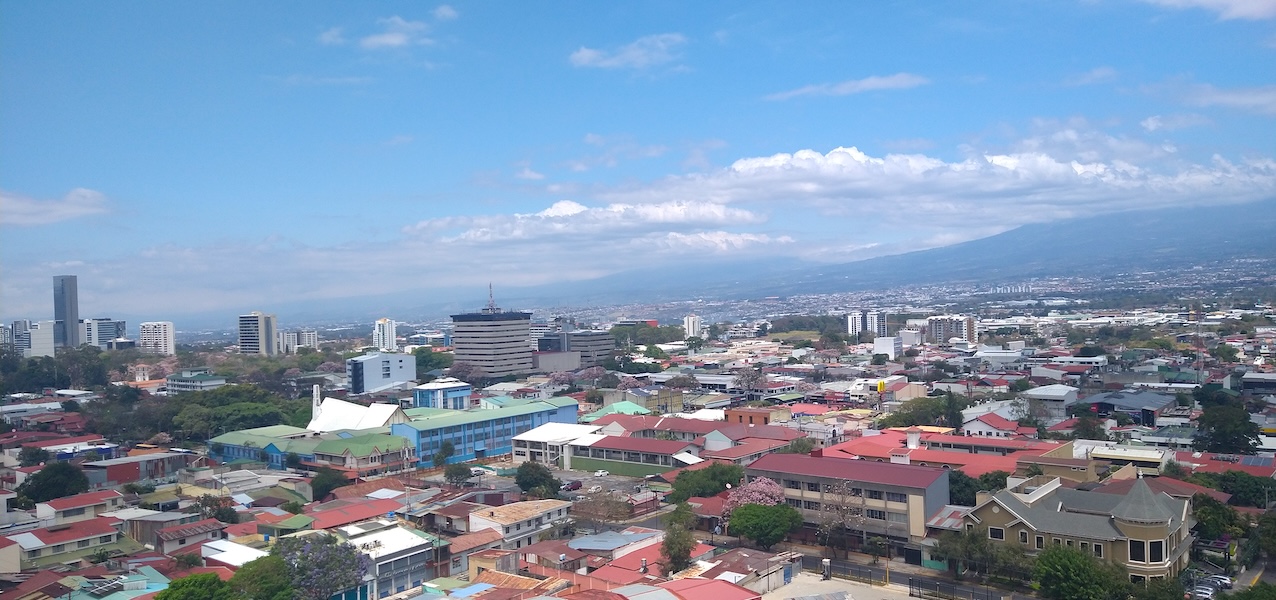
Sounds idyllic 😀 why would anyone ever leave?! Fab write-up!
The band-aid thing is inspired. The number of packets I’ve had to buy because I keep forgetting to take them with me on trip *facepalm* clearly they know the pain!
Haha fair point – I only left because I wanted to see my first total solar eclipse and that was worth it. And haha yeah buying individual band-aids is awesome.
I didn’t realize there were so many countries in the world where you can’t drink the tap water. All the things you never have to think about as a privileged Westerner….
The thing about Costa Rica not having addresses is wild. How does navigation work in Google Maps/Waze? Does it know about using local businesses as landmarks? And if a business closes or changes its name, does it mess up direction-finding for everyone who lives nearby? That sounds complicated!
Yeah 🙂 . For Google Maps I used local businesses or actual landmarks (e.g. parks). I imagine a business moving would mess things up if everything isn’t updated, but I didn’t encounter that issue personally. There are also parks everywhere that I imagine won’t be moving anytime soon that were helpful landmarks for navigation.
Love the travel detail! I did not know there was a San Jose outside of California TBH lol
I’m glad you like the detail and haha yep!
Makes me want to revisit San Jose for a slower time there! The Airbnb with a pool is a huge plus
Yeah it’s a fun place to chill and always having a pool was definitely a lovely perk.
There’s a historical reason you didn’t see many Black people in San Jose – until 1949 Afro-Costa Ricans legally couldn’t travel outside of the Atlantic coastal areas without specific governmental permission. In the Limon area, some areas are 90% Black. Unfortunately they are also some of the poorest areas in the country.
https://revista.drclas.harvard.edu/voices-of-the-caribbean-afro-costa-ricans-move-towards-empowerment-and-equality/#:~:text=Specifically%2C%20until%201949%2C%20Blacks%20were,Afrodescendant%20community%20in%20Costa%20Rica.
Thank you for telling me that. I met a black woman in San José who was on her way to the Limón area and told me I should check it out, but I didn’t know about that history.
This was one of my favorites you’ve posted about so far!
Oh wow – thank you! Was there anything you liked in particular? If so, I’ll try to keep that in mind for future posts.
I’ve been to Costa Rica once and loved it. At that time I was coming from other L. A. countries and the prices in CR were much higher than its neighbors. I spent most time on the coast and in the mountains, and the wildlife and birding was just astonishing. I don’t spend much time in SJ, but regarding the country as a whole, my impression was definitely that people lived well and were happy. There are no utopias, of course, but a peaceful and democratic country like CR has the first steps down.
RE: the ATM currency choice, I’m not sure if this happens to everyone, but I get the same option on all foreign credit card transactions, and the same deal applies there: always choose to process the transaction in local currency to avoid hefty currency conversion markups.
I completely agree 🙂 . There are no utopias, but some countries seem to value the happiness of its citizens over other things and CR seems up there to me.
That hasn’t happened to me yet, but I’ve been on the look out for it since I went down that ATM currency exchange rabbit hole. Thank you for the reminder!
Beautiful write-up; did not know Costa Rica was so visitable; I am from India and to me it feels like its on the other side of the world; and it literally is 😀
Would love to visit some day.
Haha yeah that’s quite a ways away. I’ve been enjoying checking out things that are close to the US.